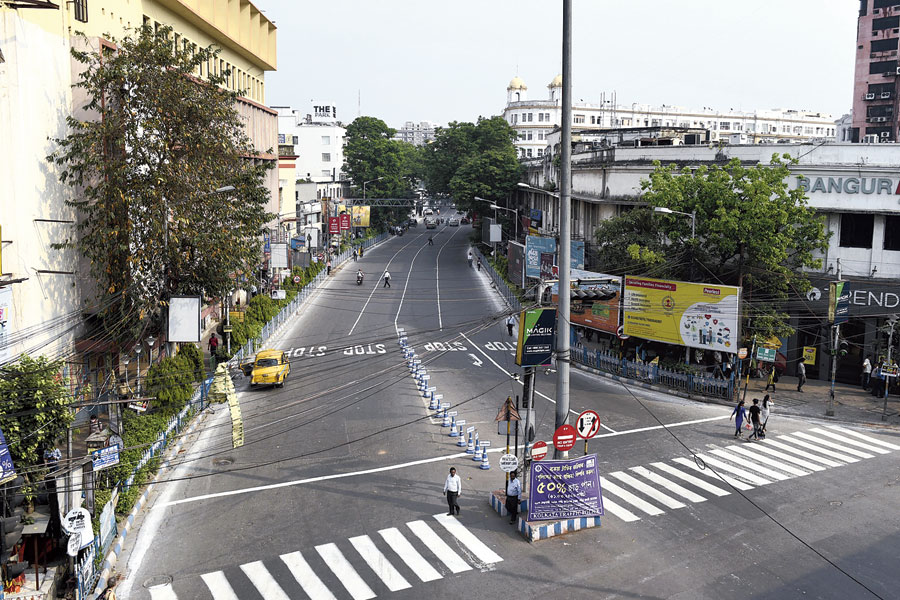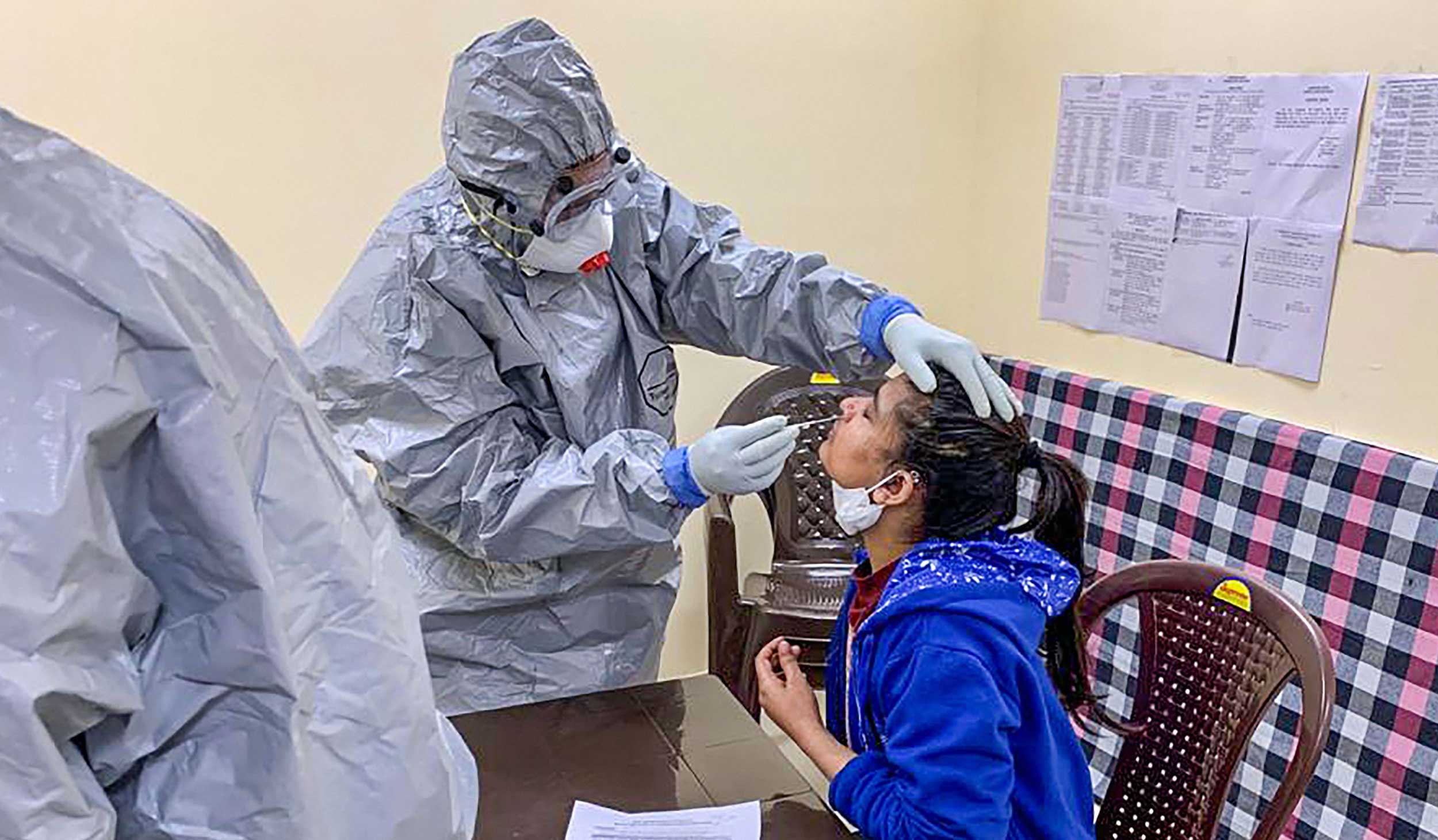The Centre on Monday advocated a nationwide shutdown of educational institutions, postponement of gatherings and the adoption of work-from-home options till March 31 as part of escalating social-distancing responses to the threat from the novel coronavirus.
The government also announced a temporary ban on the entry of travellers from the European Union, United Kingdom and Turkey from March 18, and a compulsory quarantine of at least 14 days for travellers from Kuwait, Oman, Qatar and the United Arab Emirates.
Till Monday afternoon, India had documented 114 patients with Covid-19 (the coronavirus disease) — all with a history of recent foreign travel or contact with a person with a foreign travel history. Thirteen patients have recovered and been discharged while two have died.
The 99 coronavirus-positive patients currently under treatment, including Odisha’s first case that emerged on Monday, are in hospitals in 15 states.
A Group of Ministers chaired by Union health minister Harsh Vardhan has recommended the closure of all educational institutions, gyms, museums, cultural and social centres, swimming pools and theatres.
A special social distancing advisory from the GoM has also advised students to remain home and asked institutions to promote online education.
The advisory also said that “non-essential travel should be avoided” and asked that social distancing be maximised in all public transport, from buses and trains to aircraft, besides ensuring regular and proper disinfecting of surfaces.
It urged education authorities to consider postponing exams and said that ongoing exams should be conducted only after ensuring there’s a physical distance of at least one metre between any two students.
It advocated the postponement of non-essential social and cultural gatherings and urged the public to keep “already planned weddings to a limited gathering”.
The advisory asked local authorities — presumably district-level administrators — to engage with opinion makers and religious leaders to regulate mass gatherings and ensure a distance of at least one metre between people.
It nudged private organisations to allow staff to work from home wherever feasible, conduct meetings through videoconferencing and minimise or reschedule meetings of large numbers of people.
Social distancing is a “non-pharmaceutical intervention” to avoid or decrease contact between those who are infected and those who are not to help slow down the rate and extent of an infectious disease, the advisory said.
Public health experts see the social-distancing advisory as an effort to prevent the local transmission of the coronavirus from progressing into community transmission. In local transmission, a person bringing the virus from foreign travel passes it on to contacts. In community transmission, people pick up the infection without any obvious chain of contact.
While officials from the health ministry and the Indian Council of Medical Research have asserted there is no evidence for community transmission in India, virologists have cautioned that the phenomenon cannot be ruled out because the country has not yet started systematically looking for evidence of it.
The social-distancing advisory says that restaurants should ensure a hand-washing protocol, keep a physical distance of one metre between tables and encourage open-air seating wherever possible.
The health ministry said the states and Union Territories might prescribe other such measures if considered necessary.
It reaffirmed personal precautions such as hand-washing, respiratory etiquette and cessation of contact such as handshakes and hugs.
In a travel advisory, the government prohibited the travel of passengers from the EU, the European Free Trade Association, Turkey and the UK to India from March 18.
“No airline shall board a passenger from these nations to India with effect from 1200 GMT (5.30pm Indian time) March 18. The airline(s) shall enforce this at the port of initial departure,” it said.
At present, only passengers from China, Italy, Iran, South Korea, France, Spain and Germany are quarantined. From March 18, those from Kuwait, Oman, Qatar and the United Arab Emirates would join them. The travel advisory will be reviewed on March 31.
Delhi initiatives
Delhi’s state government on Monday ordered the closure of gyms, nightclubs, spas and theatres and capped the size of social, cultural, political, academic or family gatherings to 50 people up to March 31.
The order excluded weddings from the 50-people restriction but chief minister Arvind Kejriwal appealed to the public to try and postpone weddings. The state had last week ordered a temporary closure of all educational institutions and cinemas.
He said water and soap would be available at public places to facilitate hand-washing.
Paid quarantine
Amid complaints about poor living conditions in government-run quarantine facilities in Delhi, Kejriwal announced that travellers may opt to pay for their own quarantine in any of three hotels with which his government has signed pacts.
These three hotels have been told to keep ready 54, 36 and 92 rooms for paid quarantine facilities. The rooms will cost Rs 3,100 a night.
Hygiene complaints
Some people in the quarantine camps have complained about unhygienic conditions.
“Bed sheets are dirty, washrooms are flooded with water, and dust is there on the floor,” read a letter purportedly written by “travellers from France and Spain” housed at a police quarantine facility in Dwarka, southwest Delhi.
“We demand hygienic facilities, proper food and personal rooms,” read the letter, posted on Twitter by a traveller.
“We are more than 40 people with only 3 washrooms and 5 large bedrooms,” the traveller wrote. “They want us to stay sanitised and this is what they give us…. This way India cannot contain coronavirus.”













